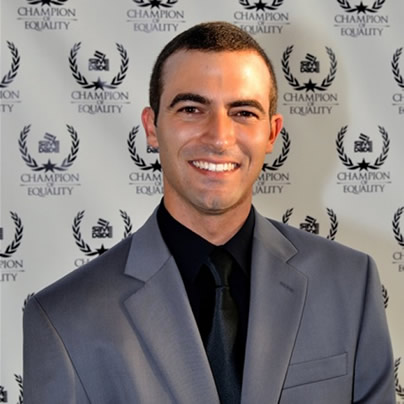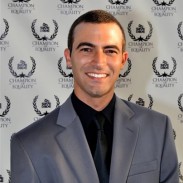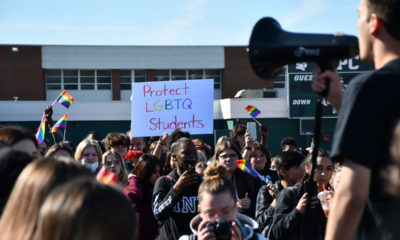National
Florida LGBT rights movement grows more visible
Local, state officials more receptive to advocates’ concerns

ST. PETERSBURG, Fla.—St. Petersburg City Councilman Steve Kornell was at his first candidate debate in 2009 when a woman in the audience asked him to respond to a “rumor” that he was gay. There was an audible gasp in the room, but Kornell did not hesitate to acknowledge his sexual orientation.
Even his opponents applauded him.
“Even though I was completely out, thousands of people didn’t know me at all so they didn’t know that about me,” Kornell, whom voters elected to represent the city’s Pinellas Point neighborhood in 2009, told the Washington Blade during a Feb. 4 interview near his home. “Somebody could have used that as an attack, and my response to that was I’m going to put it right out there.”
Kornell is among the public faces of a statewide LGBT rights movement whose profile has grown significantly over the last 15 years.
Nadine Smith, executive director of Equality Florida, said she had difficulty putting together a statewide board of directors when the organization formed in 1997 because people were afraid they would lose their jobs if they were outed. Journalists who wanted to cover Equality Florida events had to stand in the back of the room. They could only film the backs of the heads of those who had given their permission to appear on camera.
“When people stepped forward to the microphone at a county commissioner or a city council meeting to talk about the need for basic discrimination protection, they were literally risking their job,” Smith said. “There are some parts of Florida where that remains true.”
Only a handful of cities and counties included gay-specific protections in their anti-discrimination and anti-bullying ordinances in 1997. That number has grown to dozens of municipalities throughout the state.
Then-Gov. Charlie Crist in 2010 announced Florida would no longer enforce a law that banned gays and lesbians from adopting children in response to a state appellate court that found the 1977 statute unconstitutional. He signed the state’s LGBT-inclusive anti-bullying law in 2008.
State Reps. Joe Saunders (D-Orlando) and Dave Richardson (D-Miami Beach) last year made history as the first openly gay candidates elected to the state legislature. The Florida Senate Committee on Children, Families and Elder Affairs on Feb. 19 will debate a bill sponsored by state Sen. Eleanor Sobel (D-Hollywood) that would create a statewide domestic partnership registry.
Saunders and state Sen. Joe Abruzzo (D-Wellington) on Feb. 7 filed the Florida Competitive Workforce Act that would add sexual orientation and gender identity and expression to the state’s employment non-discrimination law. State Rep. Holly Raschein (R-Key West) is the proposal’s primary co-sponsor.
“Florida has changed dramatically over the last 15 years,” Smith said. “The change has accelerated in just the past three or four years.”
In spite of the aforementioned victories, the movement has suffered a series of stinging setbacks over the last decade.
Voters in 2008 approved a state constitutional amendment that defined marriage as between a man and a woman.
The Hillsborough County Commission on Jan. 24 voted 4-3 against a proposed countywide domestic partner registry — commissioners in neighboring Pinellas County that includes St. Petersburg nine days earlier approved an identical registry for unmarried same-sex and heterosexual couples. The Lake County School Board’s move to ban extra-curricular clubs in the district after a group of middle school students in Leesburg tried to form a GSA has sparked outrage among LGBT advocates and their supporters.
Smith noted the board’s announcement coincided with a near unanimous vote in the Tavares City Council on Feb. 6 that created Lake County’s first domestic partner registry.
“It’s not a direct line between here and there,” she said. “It’s a zigzag line and forward motion and push back, but the message we deliver is we’re going to keep coming because we’re fighting for our lives, for our families, for many of us for our children. We’re never going to give up.”
CJ Ortuño, executive director of SAVE (Safeguarding American Values for Everyone) Dade, brings this message to his advocacy.
The Miami Beach resident who is a straight man of Cuban descent told the Blade that a gay man named John introduced his parents. He and his partner lived downstairs, and gave them the dining room table from which Ortuño’s young daughter Amalia eats.
Ortuño said he decided to become involved with the movement during President Obama’s first presidential campaign in 2008 — the same year Florida voters approved the constitutional same-sex marriage ban.
“It was me staring at my daughter and saying, ‘I don’t know who she’s going to love when she gets older, but I’ll definitely be damned if I don’t do something,” he said. “I want to change this world and leave it a little better than the way I found it.”
SAVE Dade, which was founded in 1993 in the wake of the Anita Bryant-led movement that successfully repealed Dade County’s gay-inclusive human rights ordinance, continues to work with local municipalities to offer domestic partner benefits to their LGBT employees.
The Coral Gables City Commission last October unanimously approved domestic partner benefits to LGBT employees — more than a year after lesbian police officer Rene Tastet filed a complaint with the city manager’s office after she did not receive bereavement leave to attend her partner’s father’s funeral in North Carolina. The organization is also lobbying the Miami-Dade County Commission to add gender identity and expression to the county’s human rights ordinance.
“I think we can do that this year like our neighbors to the north (Broward County) and south (Monroe County) of us,” Ortuño said.
SAVE Dade also works with Congresswoman Ileana Ros-Lehtinen and other members of South Florida’s congressional delegation on immigration reform — and especially the Uniting American Families Act that would allow gays and lesbians to sponsor their foreign-born partners for residency in the United States. The organization also advocates for the re-authorization of the Ryan White CARE Act.
“We do the same thing on a statewide level,” he said, noting Miami-Dade has the largest legislative delegation in Tallahassee. “We don’t drive state policy, but we often support or provide resources through our Dade delegation.”
Smith said Equality Florida, which has chapters throughout the state, looks to its local partners to cultivate relationships with lawmakers in Tallahassee.
“They have a constituency that they are accountable to,” she said. “We really look to our local partners to help us reach out and cultivate these relationships. We do so much local work that the partnerships are essential.”
Saunders told the Blade during a Feb. 1 interview in his Orlando office that some of his fellow lawmakers are “still trying to readjust and figure out how to deal with this new community that’s now represented” in light of his and Richardson’s election. Kornell said his presence on the St. Petersburg City Council has had what he described as a positive impact on LGBT-specific issues.
St. Petersburg Mayor Bill Foster, whom Kornell said made some “less than pro-gay” statements when he was a city councilman, approved his proposal to extend domestic partner benefits to the city’s 1,800 non-unionized employees.
“The mayor went ahead and did it,” Kornell said. “That’s the kind of thing when we have gay people sitting at the table; those kinds of things start to shift. It’s hard to hate somebody when you get to know them.”
State Department
State Department releases annual human rights report
Antony Blinken reiterates criticism of Uganda’s Anti-Homosexuality Act

Secretary of State Antony Blinken on Monday once again reiterated his criticism of Uganda’s Anti-Homosexuality Act upon release of the State Department’s annual human rights report.
“This year’s report also captures human rights abuses against members of vulnerable communities,” he told reporters. “In Afghanistan, the Taliban have limited work opportunities for women, shuttered institutions found educating girls, and increasing floggings for women and men accused of, quote, ‘immoral behavior,’ end quote. Uganda passed a draconian and discriminatory Anti-Homosexuality Act, threatening LGBTQI+ individuals with life imprisonment, even death, simply for being with the person they loved.”
Ugandan President Yoweri Museveni last May signed the law, which contains a death penalty provision for “aggravated homosexuality.”
The U.S. subsequently imposed visa restrictions on Ugandan officials and removed the country from a program that allows sub-Saharan African countries to trade duty-free with the U.S. The World Bank Group also announced the suspension of new loans to Uganda.
Uganda’s Constitutional Court earlier this month refused to “nullify the Anti-Homosexuality Act in its totality.” More than a dozen Ugandan LGBTQ activists have appealed the ruling.
Clare Byarugaba of Chapter Four Uganda, a Ugandan LGBTQ rights group, on Monday met with National Security Council Chief-of-Staff Curtis Ried. Jay Gilliam, the senior LGBTQI+ coordinator for the U.S. Agency for International Development, in February traveled to Uganda and met with LGBTQ activists who discussed the Anti-Homosexuality Act’s impact.
“LGBTQI+ activists reported police arrested numerous individuals on the basis of their sexual orientation or gender identity and subjected many to forced anal exams, a medically discredited practice with no evidentiary value that was considered a form of cruel, inhuman, and degrading treatment and could amount to torture,” reads the human rights report.
The report, among other things, also notes Ugandan human rights activists “reported numerous instances of state and non-state actor violence and harassment against LGBTQI+ persons and noted authorities did not adequately investigate the cases.”
Report highlights anti-LGBTQ crackdowns in Ghana, Hungary, Russia
Ghanaian lawmakers on Feb. 28 approved the Promotion of Proper Human Sexual Rights and Ghanaian Family Values Bill. The country’s president, Nana Akufo-Addo, has said he will not sign the measure until the Ghanaian Supreme Court rules on whether it is constitutional or not.
The human rights report notes “laws criminalizing consensual same-sex sexual conduct between adults” and “crimes involving violence or threats of violence targeting lesbian, gay, bisexual, transgender, queer or intersex persons” are among the “significant human rights issues” in Ghana.
The report documents Hungarian Prime Minister Viktor Orbán and members of his right-wing Fidesz party’s continued rhetoric against “gender ideology.” It also notes Russia’s ongoing crackdown against LGBTQ people that includes reports of “state actors committed violence against LGBTQI+ individuals based on their sexual orientation or gender identity, particularly in Chechnya.”
The report specifically notes Russian President Vladimir Putin on July 24 signed a law that bans “legal gender recognition, medical interventions aimed at changing the sex of a person, and gender-affirming care.” It also points out Papua New Guinea is among the countries in which consensual same-sex sexual relations remain criminalized.

The Cook Islands and Mauritius in decriminalized homosexuality in 2023.
The report notes the Namibia Supreme Court last May ruled the country must recognize same-sex marriages legally performed outside the country. The report also highlights the Indian Supreme Court’s ruling against marriage equality that it issued last October. (It later announced it would consider an appeal of the decision.)
Congress requires the State Department to release a human rights report each year.
The Biden-Harris administration in 2021 released a memorandum that committed the U.S. to promoting LGBTQ+ and intersex rights abroad.
The full report can be read here.
National
Same-sex couples vulnerable to adverse effects of climate change
Williams Institute report based on Census, federal agencies

A new report by the Williams Institute at the UCLA School of Law finds that same-sex couples are at greater risk of experiencing the adverse effects of climate change compared to different-sex couples.
LGBTQ people in same-sex couple households disproportionately live in coastal areas and cities and areas with poorer infrastructure and less access to resources, making them more vulnerable to climate hazards.
Using U.S. Census data and climate risk assessment data from NASA and the Federal Emergency Management Agency, researchers conducted a geographic analysis to assess the climate risk impacting same-sex couples. NASA’s risk assessment focuses on changes to meteorological patterns, infrastructure and built environment, and the presence of at-risk populations. FEMA’s assessment focuses on changes in the occurrence of severe weather events, accounting for at-risk populations, the availability of services, and access to resources.
Results show counties with a higher proportion of same-sex couples are, on average, at increased risk from environmental, infrastructure, and social vulnerabilities due to climate change.
“Given the disparate impact of climate change on LGBTQ populations, climate change policies, including disaster preparedness, response, and recovery plans, must address the specific needs and vulnerabilities facing LGBTQ people,” said study co-author Ari Shaw, senior fellow and director of international programs at the Williams Institute. “Policies should focus on mitigating discriminatory housing and urban development practices, making shelters safe spaces for LGBT people, and ensuring that relief aid reaches displaced LGBTQ individuals and families.”
“Factors underlying the geographic vulnerability are crucial to understanding why same-sex couples are threatened by climate change and whether the findings in our study apply to the broader LGBTQ population,” said study co-author Lindsay Mahowald, research data analyst at the Williams Institute. “More research is needed to examine how disparities in housing, employment, and health care among LGBT people compound the geographic vulnerabilities to climate change.”
Read the report
Federal Government
Lambda Legal praises Biden-Harris administration’s finalized Title IX regulations
New rules to take effect Aug. 1

The Biden-Harris administration’s revised Title IX policy “protects LGBTQ+ students from discrimination and other abuse,” Lambda Legal said in a statement praising the U.S. Department of Education’s issuance of the final rule on Friday.
Slated to take effect on Aug. 1, the new regulations constitute an expansion of the 1972 Title IX civil rights law, which prohibits sex-based discrimination in education programs that receive federal funding.
Pursuant to the U.S. Supreme Court’s ruling in the landmark 2020 Bostock v. Clayton County case, the department’s revised policy clarifies that discrimination on the basis of sexual orientation and gender identity constitutes sex-based discrimination as defined under the law.
“These regulations make it crystal clear that everyone can access schools that are safe, welcoming and that respect their rights,” Education Secretary Miguel Cardona said during a call with reporters on Thursday.
While the new rule does not provide guidance on whether schools must allow transgender students to play on sports teams corresponding with their gender identity to comply with Title IX, the question is addressed in a separate rule proposed by the agency in April.
The administration’s new policy also reverses some Trump-era Title IX rules governing how schools must respond to reports of sexual harassment and sexual assault, which were widely seen as imbalanced in favor of the accused.
Jennifer Klein, the director of the White House Gender Policy Council, said during Thursday’s call that the department sought to strike a balance with respect to these issues, “reaffirming our longstanding commitment to fundamental fairness.”
“We applaud the Biden administration’s action to rescind the legally unsound, cruel, and dangerous sexual harassment and assault rule of the previous administration,” Lambda Legal Nonbinary and Transgender Rights Project Director Sasha Buchert said in the group’s statement on Friday.
“Today’s rule instead appropriately underscores that Title IX’s civil rights protections clearly cover LGBTQ+ students, as well as survivors and pregnant and parenting students across race and gender identity,” she said. “Schools must be places where students can learn and thrive free of harassment, discrimination, and other abuse.”
-

 District of Columbia5 days ago
District of Columbia5 days agoNew D.C. LGBTQ+ bar Crush set to open April 19
-

 South America3 days ago
South America3 days agoDaniel Zamudio murderer’s parole request denied
-

 Maryland4 days ago
Maryland4 days agoMontgomery County police chief discusses arrest of trans student charged with planned school shooting
-

 Politics5 days ago
Politics5 days agoCourt records raise concerns about right-wing TikTok investor’s influence














